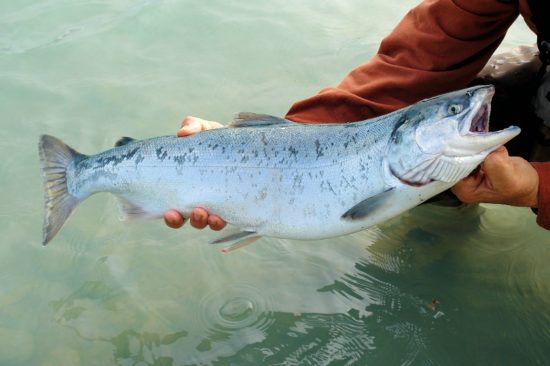Extended antibiotic treatment in salmon farms select multiresistant gut bacteria with a high prevalence of antibiotic resistance genes
The high use of antibiotics for the treatment of bacterial diseases is one of the main problems in the mass production of animal protein. Salmon farming in Chile is a clear example of the above statement, where more than 5,500 tonnes of antibiotics have been used over the last 10 years. This has caused a great impact both at the production level and on the environment; however, there are still few works in relation to it. In order to demonstrate the impact of the high use of antibiotics on fish gut microbiota, we have selected four salmon farms presenting a similar amount of fish of the Atlantic salmon species (Salmo salar), ranging from 4,500 to 6,000 tonnes. All of these farms used treatments with high doses of antibiotics. Thus, 15 healthy fish were selected and euthanised in order to isolate the bacteria resistant to the antibiotics oxytetracycline and florfenicol from the gut microbiota. In total, 47 bacterial isolates resistant to florfenicol and 44 resistant to oxytetracycline were isolated, among which isolates with Minimum Inhibitory Concentrations (MIC) exceeding 2048 μg/mL for florfenicol and 1024 μg/mL for oxytetracycline were found. In addition, another six different antibiotics were tested in order to demonstrate the multiresistance phenomenon. In this regard, six isolates of 91 showed elevated resistance values for the eight tested antibiotics, including florfenicol and oxytetracycline, were found. These bacteria were called “super-resistant” bacteria. This phenotypic resistance was verified at a genotypic level since most isolates showed antibiotic resistance genes (ARGs) to florfenicol and oxytetracycline. Specifically, 77% of antibiotic resistant bacteria showed at least one gene resistant to florfenicol and 89% showed at least one gene resistant to oxytetracycline. In the present study, it was demonstrated that the high use of the antibiotics florfenicol and oxytetracycline has, as a consequence, the selection of multiresistant bacteria in the gut microbiota of farmed fish of the Salmo salar species at the seawater stage. Also, the phenotypic resistance of these bacteria can be correlated with the presence of antibiotic resistance genes.
Source: PLOS One
Healthy Animals Secure Foods


